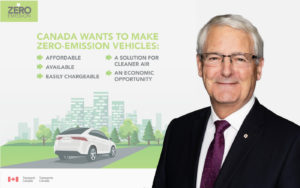Canadians have embraced the opportunity to buy electric cars with the help of a federal incentive, using nearly half of the $300 million allocated for the rebate in eight months

Background image credit: Transport Canada. Photo: Minister Garneau/Facebook
Canadians have embraced the opportunity to buy electric cars with the help of a federal incentive, using nearly half of the $300 million allocated for the rebate in eight months
Canada’s Minister of Transport Marc Garneau stated Monday that the federal government is considering expanding its electric vehicle rebate program following its strong success in encouraging sales.
Since last May, the federal government has offered Canadians up to $5,000 towards the purchase of battery electric and long-range plug-in hybrid vehicles. Transport Canada figures show that $134 million of the $300 million allocated by the government to fund three years of the program was spent in its first eight months.
“It’s very encouraging to see how many people are now thinking about and actually going ahead and buying [zero-emission vehicles]”
Minister of Transport Marc Garneau
Transport Canada also states that overall EV sales have increased by 30 per cent since the rebate was introduced (compared to the same period in 2018), with over 33,000 Canadians having received the rebate through January 19.
Incentives spark market growth
As upfront costs of EVs are typically higher than most vehicles, experts say incentive programs will play a crucial part in increasing adoption rates until EVs reach price parity with gas cars, which some have forecasted will occur as soon as 2022. Following this, adoption will likely continue to increase without government support.
“It’s very encouraging to see how many people are now thinking about and actually going ahead and buying [zero-emission vehicles],” Garneau said outside the House of Commons, according to Canadian Press.
According to Transport Canada, EVs made up 3 per cent of vehicle sales in 2019, up from 2 per cent in 2018. Last year, the government announced an aim to have electric vehicles account for 10 per cent of light duty vehicles sales by 2025, 30 per cent by 2030 and 100 per cent by 2040. The same goal was reiterated in Prime Minister Trudeau’s mandate letter to Garneau at the end of last year.
As the program’s funding is on track to be depleted by the end of 2020, an expansion of some kind would likely be necessary in order to make meeting these targets feasible.
Garneau said that he was “certainly working very hard” to expand the rebate program, but would not indicate specifically what that might entail. An expansion of the rebate program would likely be announced in the 2020 federal budget, which will be introduced this February or March.
Incentives in place
British Columbia and Quebec are currently the only Canadian provinces that offer provincial rebates on electric vehicle purchases; they also have the first and second highest (respectively) EV ownership rates. Ontario, which no longer offers an EV purchase incentive, has the third highest rate.
High rates of EV adoption can also be attributed to the adoption of zero-emission vehicle mandates. B.C.’s Zero-Emission Vehicle Act and Quebec’s ZEV Standard each require that a certain percentage (set to increase over time) of vehicles sold in the province are electric. By enacting such legislation, governments can ensure increased adoption without having to commit to the same degree of investment that a rebate requires.
There are also non-government rebate programs available to Canadian drivers looking to go electric. SCRAP-IT, a program based in B.C., offers drivers up to $6,000 for scrapping their gas vehicles, to be used towards the purchase of an EV. Last spring, Ontario-based non-profit Plug’n Drive introduced a $1,000 incentive towards the purchase of a used electric vehicle in Ontario. In February, the program will be expanded to offer another $1,000 to those willing to have their old gas car scrapped and recycled.
Note: An earlier version of this article reported that EV sales have increased by 32 per cent in 2019 from 2018. The correct statistic is 30 per cent; this article has been updated to reflect that.












